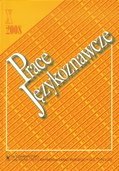Definicja kognitywna
w diagnozie logopedycznej dzieci w normie
oraz osób niepełnosprawnych intelektualnie
Cognitive Definition in Logopaedic Diagnosis of Normal Children and Intellectually Disabled Adults
Author(s): Urszula JęczeńSubject(s): Theoretical Linguistics, Applied Linguistics
Published by: Wydawnictwo Uniwersytetu Warmińsko-Mazurskiego w Olsztynie
Keywords: cognitive definition; lexicographic definition; defining; creation of concepts; definition as a “little narrative”
Summary/Abstract: This article discusses the role of cognitive definition in the process of diagnosing linguisticcompetence (at the semantic, lexical and syntactic levels) in normal children and intellectuallydisabled persons. The cognitive model of definition fundamentally differs in itsstructure and content from lexicographic and scientific definitions. The author arguesthat it is essential to distinguish the process of defining the meanings of words fromthe process of creating concepts. Moreover, it should be noted that the “understandingof meaning is not ‘closed’ once and for all, but it develops in parallel with the developmentof human thinking” (Filar 2013:31); consequently, a cognitive definition enables showingrelationships between individual concepts, provides an insight into the store of knowledgethat a subject has, and highlights the differences between the child’s structure of conceptsand the concepts utilized by adult language users. It illustrates the character of theconceptual sphere (e.g. the presence of only some categories in the conceptual structure),and the specificity of defining of words (e.g. poverty of lexical means) in the definitionsformulated by an intellectually disabled person.
Journal: Prace Językoznawcze
- Issue Year: 21/2019
- Issue No: 4
- Page Range: 77-95
- Page Count: 19
- Language: Polish

